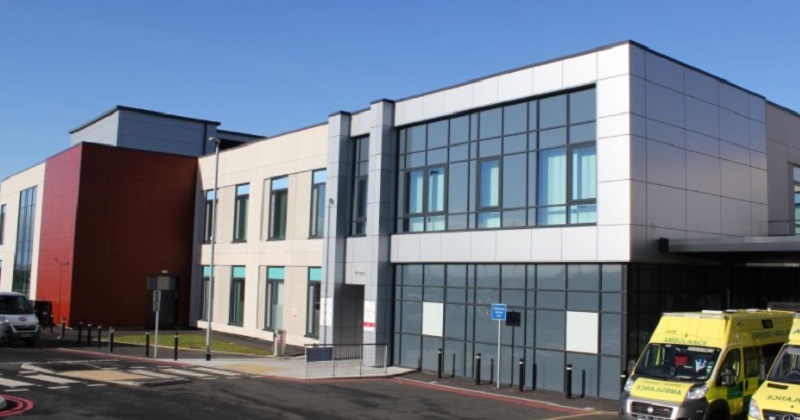The past 12 months has taken its toll on the construction industry, with the number of healthcare projects starting on site falling by 47% in the last quarter of 2021 compared to the previous year.
And project starts were down 31% between September and December compared to the previous quarter.
This decline was largely due to a total absence of any major health projects worth £100m or more in value, according to Glenigan’s January construction industry report.
It states that underlying project starts – worth less than £100m – totalled £510m in the last quarter of the year, a fall of 36% compared with a year ago and 23% against the preceding quarter on a seasonally-adjusted basis.
Underlying health main contract awards added up to £451m during the same period, a 33% decline against the previous year and a 45% fall compared with the third quarter.
And no major projects reached the contract awarded stage during this period, remaining unchanged on both the previous year and the preceding quarter.

Health approvals over the last quarter of 2021 included a £40m extension to the West Cumberland Hospital in Whitehaven
Hospitals hit hard
Totalling £863m, underlying health detailed planning approvals also fell 9% against the previous year and 19% compared with the preceding quarter.
The report states that all areas within the health sector experienced a decline in project starts compared with a year ago.
Hospitals, in particular, experienced their weakest period, with the value of work starting onsite in the last quarter of the year falling 62% against the previous year.
But, despite this, hospital project starts totalled £203m and accounted for the greatest share of the sector at 40%.
And nursing home project starts added up to £95m, a 54% decline compared with the previous year to account for 19% of the sector.
Looking across England, the East accounted for 21% of health work commencing on site during the last quarter, with a total value of £109m.
However, despite accounting for the greatest proportion of sector starts, the region experienced a 7% decline against the previous year.
Projects included a new £66m laboratory in Stevenage.
The South West accounted for the second-greatest share of sector starts, with 16%, despite having experienced a 53% fall against the previous year.
Work totalled £83m and included the £60m extension to the Royal Bournemouth Hospital.
Regional variation
The South East, where project-starts totalled £63m, was another active region which experienced a sharp decline – down 62% compared with the previous year.
In contrast, the North West bucked the trend and witnessed a 78% growth in health project starts to total £76m.
And project starts in the West Midlands increased 87% against the previous year to total £66m, accounting for 13% of the sector.
London, and Yorkshire and the Humber were other growth areas for health work commencing on site during the quarter.
The East of England also accounted for the largest share of health detailed planning approvals (16%) with the region having experienced 68% growth against the previous year to total £136m.
While no single project was responsible for this growth, project approvals included a £16m research and development facility in Braintree.
Despite a decline nationally, other regions also achieved growth in project approvals. In particular, the North West experienced an 81% increase against the previous year to total £120m, accounting for 14% of the sector.
Health approvals included a £40m extension to the West Cumberland Hospital in Whitehaven.

Edinburgh BioQuarter has formally launched its public procurement process for a private sector partner to create a £1billion health innovation district
On the up
The North East experienced the strongest period for sector approvals, with growth of 198% against the previous year to total £90m, accounting for 10% of the sector. This work includes the approval of the £36m Sunderland Eye Infirmary.
Health approvals also performed well in Yorkshire and the Humber, where the value of approvals increased by a fifth compared with a year ago to total £112m.
But Glenigan figures also show some hope for the sector, particularly within the pharmaceutical market.
The need to increase capacity for the production and distribution of COVID-19 vaccines has helped to spur investment.
At an industry summit hosted by Boris Johnson before Christmas signalled a further £500m industry investment in the UK life sciences sector, taking the total since last July to over £5billion.
One significant new project entered the construction pipeline during the summit when the Japanese group, Fujifilm Diosynth Biotechnologies, announced plans to invest £400m to expand its site at Billingham on Teeside in the North East.
The project, which the firm says will double its manufacturing footprint and create the largest multi-modal biopharmaceutical manufacturing site in the UK, will create 350 new jobs when it starts operating in 2023.
Pharma takes the lead
It will involve the creation of two new facilities and include over 20,000 sq ft of cleanroom space along with quality control labs, offices, and materials storage space.
Other new pharma construction investments include a £17m headquarters expansion by Bristol Myers Squibb and a £11.7m digital surgery ecosystem in Leeds by J&J.
The latest projects will add to the growing construction workload in the sector as major pharmaceutical groups invest in new buildings.
Work could also start this autumn on the £400m GlaxoSmithKline Research Centre’s campus at Stevenage in Hertfordshire.
A formal process is underway to seek a development partner for the scheme, which is set to transform its existing 92-acre R&D site and which is at the pre-tender stage.
Expansion plans at medium-sized pharma groups are also creating opportunities for construction contracts on smaller projects in the sector.
Work is set to start in the spring on a £28m extension over 1,700sq m at a manufacturing facility for Achilles Therapeutics at Hayes in west London.
ISG Construction is the main contractor on the project, where work is set to run for six months.
Elsewhere, detailed plans have recently been granted for a £1.9m extension to a pharmaceutical building for KD Pharma Group in Middlesbrough.
Looking to the future
In the long term, moves to encourage the development of major life sciences clusters in university cities around the country should also generate new construction contracts, says the report.
At the Edinburgh BioQuarter an initiative called EBQ3, which has been set up by the city council, Edinburgh University, and Scottish Enterprise, is seeking a private-sector partner to progress a health innovation district under a framework agreement.
The venture will include new buildings, infrastructure, and public realm facilities and will involve an estimated £1billion of PPP funding.
And the 3.8% real-term growth rate in NHS capital funding announced over the past year is set to lift project starts across the sector over the next year.
This is supported by the Government’s £4.2bn increase in health capital announced in the last Spending Review and the previously-announced plans to build 40 new hospitals by 2030 and upgrade more than 70 others over the same period.
